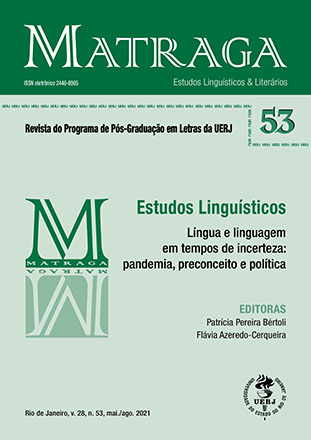Variação de registro na Internet: uma análise multidimensional
DOI:
https://doi.org/10.12957/matraga.2021.59614Palavras-chave:
Registros da web, Linguagem da internet, Análise multidimensional, Registros híbridos, Variação de registro.Resumo
Grande parte das pesquisas linguísticas sobre a internet tem como base o estudo de características linguísticas específicas que ocorrem na linguagem da internet (por exemplo, o uso de emoticons, abreviaturas, contrações e acrônimos) e também os “novos” registros da internet, aqueles mais evidentes, como por exemplo, blogs, fóruns da Internet, mensagens instantâneas e tweets. A análise multidimensional (AMD) já foi utilizada para investigar registros da internet, principalmente na análise de características gramaticais fundamentais, como por exemplo, substantivos, verbos e preposições. Uma pesquisa de cunho multidimensional difere de forma teórica e metodológica da maioria das abordagens de pesquisa no campo da linguística na medida em que ela se constrói a partir da noção de coocorrência linguística, que defende a ideia de que as diferenças entre registros podem ser descritas de forma mais adequada quando consideramos os conjuntos de características linguísticas que possuem base funcional. Contudo, a maioria dos estudos multidimensionais já realizados anteriormente são semelhantes a outras pesquisas sobre os novos registros da internet, como por exemplo, blogs, posts do Facebook/Twitter e mensagens de e-mail. Estes são os registros que quase sempre associamos com a internet, e por isso faz sentido que eles sejam o foco da maioria das pesquisas já realizadas. No entanto, isso só mostra como sabemos pouco sobre a complexidade dos registros encontrados na web e os padrões de variação linguística entre eles. Este é o objetivo do presente estudo. Em vez de começar com o foco nos novos registros que são considerados interessantes por natureza, analisamos uma amostra representativa de toda a web. Os usuários finais codificaram as características situacionais e comunicativas de cada documento do corpus, levando a uma gama muito mais ampla de categorias de registro do que as utilizadas em qualquer outro estudo feito anteriormente: oito categorias gerais; várias categorias de registros híbridos; e vinte e sete categorias de registros específicos. Esta abordagem é capaz de gerar uma amostra muito mais inclusiva e diversificada de registros da web do que qualquer outro estudo já realizado em língua inglesa. O objetivo deste estudo é documentar os padrões de variação linguística que subjazem esses registros. Por meio da AMD, revelamos as dimensões da variação linguística da web e as semelhanças e diferenças entre os registros que compõem essas dimensões.
---
Tradução de Patrícia Pereira Bértoli, Simone Vieira Resende e Flávia Azeredo-Cerqueira.
Downloads
Downloads
Publicado
Como Citar
Edição
Seção
Licença
AUTORIZAÇÃO
A Matraga – Revista do Programa de Pós-Graduação em Letras da UERJ está autorizada a publicar o artigo ora submetido, caso seja aceito para publicação online. Fica atestado que a contribuição é original, que não está sendo submetida a outro editor para publicação, e que a presente declaração é a expressão da verdade.
Os trabalhos publicados no espaço virtual da Matraga – Revista do Programa de Pós-Graduação em Letras da UERJ serão automaticamente cedidos, ficando os seus direitos autorais reservados à Matraga. Sua reprodução, total ou parcial, é condicionada à citação dos autores e dos dados da publicação.

A Matraga utiliza uma Licença Creative Commons - Atribuição-NãoComercial 4.0 Internacional.





